| 7 August |
• yesterday • tomorrow |
| Optional Memorial of Saint Sixtus II, Pope, and Companions, Martyrs; Optional Memorial of Saint Cajetan, Priest |
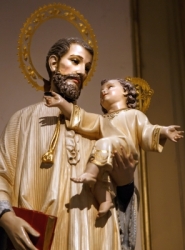
• Cajetan the Theatine
• Cajetan of Thiene
• Gaetano dei Conti di Tiene
• Gaetano da Thiene
• Cayetano, Gaetano, Gaetanus, Kajetana
Cajetan was born the second son of pious and noble parents, Caspar de Thienna and Maria Porta, who dedicated him as an infant to the Blessed Virgin Mary. From childhood he was known as "the Saint", and in later years as "the hunter of souls." A distinguished student, he studied law in Padua, Italy, and was offered positions in the government, but he turned them down and left his native town to seek a religious vocation and obscurity in Rome. Found out, he was forced at age 28 to accept a position at the court of Pope Julius II. He was ordained a priest at age 36.
On the death of Pope Julius, Cajetan returned to Vicenza and disgusted his relatives by joining the Confraternity of Saint Jerome, whose members normally were drawn from the lowest and poorest classes. Cajetan spent his fortune in building hospitals, and devoted himself to nursing the plague-stricken. He founded a bank to help the poor and offer an alternative to loan sharks; it later became the Bank of Naples. He was known for a gentle game he played with parishioners where he would bet prayers, rosaries or devotional candles on whether he would perform some service for them; he always did, and they always had to "pay" by saying the prayers.
To renew the lives of the clergy, on 3 May 1524 in Rome, with the help of three others, including the future Pope Paul IV, he formed the Congregation of Clerks Regular, known as the Theatines. They devoted themselves to preaching, the administration of the Sacraments, and the careful performance of the Church's rites and ceremonies. Saint Cajetan was the first to introduce the Forty Hours' Adoration of the Blessed Sacrament as an antidote to the heresy of Calvinism. When the Germans, under the Constable Bourbon, sacked Rome, Saint Cajetan was scourged to extort money from him; what his attackers did not understand was that he had long before spent his worldly wealth on good works.
Cajetan had a great devotion to the Blessed Virgin Mary. His piety was rewarded one Christmas eve when she appeared to him and placed the Infant Jesus in his arms. When Saint Cajetan was on his death-bed, resigned to the will of God, she appeared to him again, this time surrounded by ministering angels. He said, "Lady, bless me!" Mary replied, "Cajetan, receive the blessing of my Son, and know that I am here as a reward for the sincerity of your love, and to lead you to Paradise." She then told him to have patience with the illness that had attacked him, and gave orders to the choirs of angels to escort his soul to heaven. "Cajetan," she said, "my Son calls you. Let us go in peace." And so, he did.
October 1480 at Vicenza, Italy as Gaetano dei Conti di Tiene
1547 at Naples, Italy of natural causes
12 April 1671 by Pope Clement X
• job seekers
• unemployed people
• Theatines
https://catholicsaints.info/saint-cajetan/

May have trained as a shoemaker in his youth. Joined the Friars Minor at age 14 at the convent of San Giuliano outside L'Aquila, Italy, and spent his teen-aged novitiate in a hut in the forest near the convent, leaving it only when for services, Mass, or when called upon by his superiors. Reported to levitate, and appeared to be unconscious when in prayer. Assigned for several years at a time to convents in Penne and Sulmona before finally returning to San Giuliano; at each one his exemplary example led others to a deeper life in the faith and a more intense call to their vocation. Known for his humility and gift of prophecy, he was sought out for his advice by princes and queens. Hobbled by gout and the hardships of his life, Vincent was eventually confined to his hut where he spent his final days in prayer and giving spiritual advice to visitors.
c.1435
• evening of 7 August 1504 in his hut in the forest outside the convent of San Giualiano near L'Aquila, Italy of natural causes
• Blessed Christina Ciccarelli saw his soul taken to heaven by angels
• at his death, the entire forest around his hut was lit by a great light; this led to a custom of lighting the convent and the part of the nearby forest every year over night on 6 August, the eve of his death and commoration
• interred in the church of the San Giuliano convent
19 September 1787 by Pope Pius VI (cultus confirmation)
https://catholicsaints.info/blessed-vincent-de-laquila/
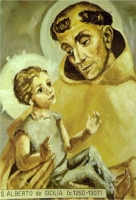
• Albert of Trapani
• Albert degli Abbati
Albert's parents promised that if they were blessed with a son, he would be dedicated to Our Lady of Mount Carmel. Educated in a Carmelite monastery, and joined the Order at age 18. Priest. Teacher in the monastery. Mendicant preacher to the Sicilians, making many conversions; especially devoted to, and successful with, Sicilian Jews. Miracle worker. Sicilian Carmelite provincial in 1257, and worked both as preacher and administrator.
In 1301, the city of Messina, Italy was under siege and blockade by Duke Robert of Calabria, Italy. Disease ridden and facing imminent starvation, the Messina city fathers asked Albert and the monastery for intervention. Albert celebrated Mass, offering it as a plea for God's deliverance. As he finished, three ships loaded with grain ran the blockade. The city was saved from starvation, and Robert lifted the seige. Albert was so well remembered for this intervention that a city gate was dedicated in his honor over 300 years later.
In his later years, Albert retired to a small monastery near Messina, and spent his time in prayer, meditation, and communion.
1250 to 1257 (sources vary) at Trapani, Sicily, Italy
7 August 1306 at Messina, Italy of natural causes
31 May 1476 by Pope Sixtus IV
• Carmelite schools
• Messina, Italy
• Trapani, Italy
https://catholicsaints.info/saint-albert-of-sicily/
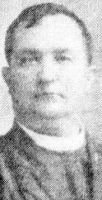
Michele de la Mora
Ordained in 1906. Chaplain of the Cabildo of the Cathedral of Colima, Mexico in 1912. When the government's persecution of the Church began, Father Miguel was arrested, but quickly released on bail with a warning to stop his ministry. When the churches were closed and public worship outlawed in 1926, friends tried to get him to flee the area; unwilling to leave Colima without a priest, he refused.
Father Miguel was constantly harassed by General Flores who wanted the padre to join the planned government-supported church that would be free of Vatican loyalties. To escape this bullying, de la Mora finally retreated to his brother's ranch at El Rincón del Tigre. While en route, Miguel was asked to perform a marriage; some unfriendly locals overhead the request, told the authorities, and Miguel and his companions were arrested. Flores, furious that del Mora was escaping, had the priest taken to a stable, stood among piles of manure, and executed in front of his brother Regino; Miguel died praying the rosary for them all. Martyr.
19 June 1874 at Tecalitlán, Jalisco, Mexico
• shot by firing squad around noon on 7 August 1927 at Cardonna, Colima, Mexico
• relics in the cathedral of Colima
21 May 2000 by Pope John Paul II during the Jubilee of Mexico
https://catholicsaints.info/saint-miguel-de-la-mora/
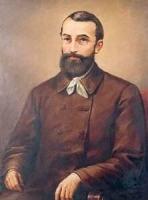
• Edmund Bojanowski Adalbert Stanislas
• Edmund Wojciech Stanislaw
A member of a wealthy, landed, Polish noble family. He studied literature at universities in Breslau (modern Wroclaw, Poland) and Berlin, Germany. Translated works from Serbia to Polish, wrote his own poetry, and a history of Serbia. Contracted tuberculosis in his 20s. He dedicated his life to the service of abandoned children, the sick, and poor, teaching and spending his fortune in the service of the needy. He founded reading rooms and libraries to provide books and education to the poor, and started the first day-care centers in the country. He funded assistance for the sick, supported orphanages, and worked in both himself. Founded the Sisters Servants of Mary Immaculate, the Sisters Handmaids of the Holy and Immaculate Virgin Mary, the Little Servant Sisters of the Immaculate Conception, and the Sisters Handmaids of the Mother of God, Virgin Immaculate Conception; together their 3,300 sisters continue the work around the world. Two years before his death Edmund entered the seminary, but did not survive long enough to graduate or be ordained.
14 November 1814 in Grabonog, Poland
7 August 1871 in Gorka Duchowna, Poland of natural causes
13 June 1999 by Pope John Paul II at Warsaw, Poland
https://catholicsaints.info/blessed-edmund-bojanowski/
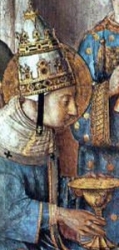
Philosopher and adult convert to Christianity. Deacon in Rome, Italy. Pope for less than a year.
He dealt with the controversy concerning baptism by heretics. He believed that anyone who was baptised with a desire to be a Christian, even if the baptism was performed by a heretic, was truly baptised into the faith, and that the validity of his faith was based on his own desire and actions, not the errors of the person who performed the sacrament.
While celebrating Mass at the tomb of Saint Callistus, he was arrested as part of the persecutions of Valerian. He was beheaded with six deacons and sub-deacons, and was buried in the same catacomb where he had been celebrating Mass when he was arrested; his name occurs in the prayer Communicantes in the Canon of the Mass. Martyr.
Greek
30 August 257
beheaded on 6 August 258 in a cemetery on the Appian Way, Rome, Italy
Bellegra, Italy
• giving Saint Lawrence a bag of money to give to the poor
• with Saint Lawrence
• with Saint Lawrence and Saint John the Baptist
https://catholicsaints.info/pope-saint-sixtus-ii/
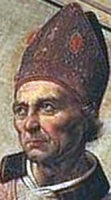
Donato
Educated in Rome, Italy. During the persecutions of Diocletian, he fled from Rome to Arezzo, Italy. There his obvious sanctity and education led to his election as the second bishop of Arezzo in 346. Due to the number of saints named Donatus, there is some confusion about his death; he may have been martyred in Rome, but he may have died of natural causes in Arezzo.
Nicomedia (part of modern Turkey)
• 362
• interred in the cathedral of Arezzo, Italy
• some relics at Ostia, Italy
• some relics at the basilica of San Donato in Murano, Venice, Italy
• Arezzo, Italy
• Arezzo, Italy, diocese of
• Arezzo-Cortona-Sansepolcro, Italy, diocese of
• Cavriglia, Italy
• bishop with a sword and dragon
• bishop beheaded with sword
• bishop stabbed with a dagger
• bishop freeing a poisoned well from a dragon
• bishop kneeling at an altar with an angel whispering to him
• bishop with a chalice and dragon at his feet
• bishop on horseback, raising his crozier at a dragon
https://catholicsaints.info/saint-donatus-of-arezzo-7-august/
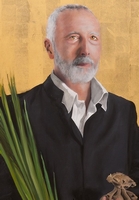
• Edward Helmes
• Edward Reding
• Edward Richardson
• Edward Wallis
• Edward Walsh
• 22 November as one of the Martyrs of England, Scotland, and Wales
• 29 October as one of the Martyrs of Douai
Studied at the seminary of Saint Omer, and at the English College of Saint Gregory in Seville, Spain. Ordained in Seville in 1626. He returned to England to minister to covert Catholics, mainly in Lancashire. He was immediately arrested upon landing, but released. Arrested in 1643, he was condemned for the crime of priesthood. One of the Martyrs of England, Scotland, and Wales.
c.1600 in Carleton, Lancashire, England
hanged, drawn, and quartered on 7 August 1646 in Lancaster, Lancashire, England
22 November 1987 by Pope John Paul II
https://catholicsaints.info/blessed-edward-bamber/

Prostitute. During the Diocletian persecutions, she and her mother Hilaria hid their bishop. He converted them, and Afra devoted herself to working with the poor. Eventually she was ordered to sacrifice to pagan gods; she refused. Martyr.
When her mother, Saint Hilaria of Augsburg, and the servants Digna, Eunomia and Eprepria went to inter her burned remains in a sepulchre, they were caught by the authorities. The four of them were ordered to make the same sacrifice that Afra had refused. They refused, and were burned to death in Afra's sepulchre.
at Augsburg, Bavaria, Germany
suffocated from smoke inhalation while being burned alive c.304 at Augsburg, Bavaria, Germany
• Augsburg, Germany
• converts
• martyrs
• penitent women
woman being burned alive
https://catholicsaints.info/saint-afra-of-augsburg/
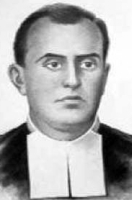
Carlos Jorge
Began the Lasallian novitiate in Bujedo, Spain on 2 February 1925, taking the name Carlos Jorge. Taught at Nuestra Señora de las Maravillas College in Madrid, Spain until anti–Christian forces destroyed it by a fire in 1931. Taught at the Cuevas Community in Almeria, Spain. Taught at the Chamberi School in Madrid, Spain in 1932. Taught in Consuegra, Toledo, Spain. Arrested by anti–Christian militants on 21 July 1936 with the other Lasallian Brothers in his community during 9 o’clock Mass. Martyred in the Spanish Civil War.
22 November 1908 in Capillas, Palencia, Spain
over the night of 6 to 7 August 1936 in “Boca del Congosto”, Los Yébenes, Toledo, Spain
28 October 2007 by Pope Benedict XVI
https://catholicsaints.info/blessed-dalmacio-bellota-perez/
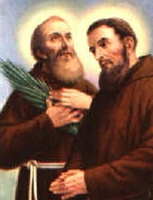
• Agathangelo Noury
• Agathangelus of Vendome
• Agathangelus Noury
• Agathange Noury of Vendôme
11 August (Franciscan calendar)
Joined the Capuchins at Le Mans, France in 1619. Taught theology at Rennes, France. Missionary to the Copts in Egypt in 1633 with Blessed Cassianus. They met with little success, and moved on to Abyssinia. Martyr.
31 July 1598 near Vendome, France
stoned to death or hanged with the cords of his own robes (records vary) on 7 August 1638 at Dibauria, Abyssinia
• 23 October 1904 by Pope Pius X
• formal recognition on 1 January 1905
https://catholicsaints.info/blessed-agathangelus-nourry/

Officer in the army of emperor Julian the Apostate in the mid-4th century who retired when he decided that military service was incompatible with Christianity. For this action he was tortured and sentenced to death, but no one acted on the execution order. Friend of Saint Martin of Tours. Missionary to non-Christian tribes in northern France. Bishop of Rouen in 380. Zealous pastor and evangelist to his flock. Brought the relics of several saints to parishes in his diocese including those of Gervase, Protase, Agrícola, and Proculus of Bologna. Wrote the treatise De laude sanctorum (Praise of the Saints).
407 in Rouen, France
https://catholicsaints.info/saint-victricius-of-rouen/
Thomas Starkie
22 November as one of the Martyrs of England, Scotland, and Wales
Son of Thomas, a schoolmaster, and Helen. Studied at Saint Omer and in Valladolid, Spain. Ordained at Valladolid in 1638. He returned to England where he spent five years ministering to covert Catholics in Lancashire. Arrested, imprisoned from 7 August 1643 to 1646, and condemned to death for the crime of being a priest. One of the Martyrs of England, Scotland, and Wales.
c.1612 in Burnley, Lancashire, England
hanged, drawn, and quartered on 7 August 1646 in Lancaster, England
22 November 1987 by Pope John Paul II
https://catholicsaints.info/blessed-thomas-whitaker/

A princess, the daughter of British King Caractacus. Imprisoned with her father and taken with him to Rome, Italy in retaliation for his resistance to the Empire during the reign of Claudius. There she learned of and converted to Christianity, taking the name Claudia. Married Senator Pudens. Mother of Saint Praxedes and Saint Pudentiana. Mentioned by Saint Paul the Apostle in 2nd Timothy 4:21 ("Eubulus, Pudens, Linus, Claudia, and all the brothers send greetings"). Widow.
https://catholicsaints.info/saint-claudia-of-rome/

Jordan of Padua
Benedictine monk at Padua. Abbot at Saint Justina's abbey at Padua. Involved in local politics, he helped ally several Lombard cities. Entrusted with the city government by the Holy Roman Emperor Frederick II. This led to his being imprisoned three years by Count Ezzelino.
1158 at Padua, Italy
1248 at Venice of natural causes
https://catholicsaints.info/blessed-jordan-forzatei/
• 29 October as one of the Martyrs of Douai
• 22 November as one of the Martyrs of England, Scotland, and Wales
Priest for 50 years, serving covert Catholics in the apostolic vicariate of England. Martyr.
1597 in Egton Bridge, North Yorkshire, England
7 August 1679 in York, North Yorkshire, England
22 November 1987 by Pope John Paul II
https://catholicsaints.info/blessed-nicholas-postgate/
• John Farington
• John Thompson
• Martin of Saint Felix
22 November as one of the Martyrs of England, Scotland, and Wales
Franciscan Friar Minor (Recollects) priest. Martyr.
1603 in Clayton-le-Woods, Lancashire, England
7 August 1646 in Lancaster, Lancashire, England
22 November 1987 by Pope John Paul II
https://catholicsaints.info/blessed-john-woodcock/
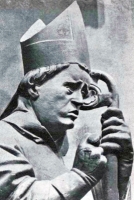
Benedictine monk at Luxeuil, France. Bishop of Besançon, France in 624. Noted monastic reformer. Founded Saint Paul abbey at Besançon. Wrote a Rule for Virgins that combines elements of the Benedictine and Columban Rules.
c.660 of natural causes
Cercepiccola, Italy
https://catholicsaints.info/saint-donatus-of-besancon/

Capuchin monk at Angers, France. Missionary with Blessed Agathangelus to the Egyptian Copts. Martyr.
1607 at Nantes, France
stoned to death in 1638 in Abyssinia (modern Ethiopia)
1 January 1904 by Pope Saint Pius X
https://catholicsaints.info/blessed-cassian-vaz-lopez-neto/
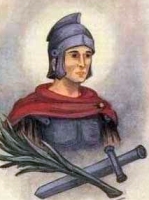
Born to the wealthy nobility, the son of Philip. Soldier. Martyred in the persecutions of Commodus.
2nd century Milan, Italy
c.190 in Milan, Italy
https://catholicsaints.info/saint-faustus-of-milan/
Fourth-century bishop of Châlons-sur-Marne, France. One of the signatories of the documents of the Council of Sardica in 343.
4th century
https://catholicsaints.info/saint-donatian-of-chalons-sur-marne/
Juliana
One of a group of over 20 martyrs who died together in the persecutions of Valerian and Gallienus.
martyred c.260 in Rome, Italy
https://catholicsaints.info/saint-julian-of-rome/
Hilary
Fourth century monk. Martyred in the persecutions of Julian the Apostate.
scourged to death in 361 at Ostia, Italy
https://catholicsaints.info/saint-hilarinus-of-ostia/
One of a group of over 20 martyrs who died together in the persecutions of Valerian and Gallienus.
c.260 in Rome, Italy
https://catholicsaints.info/saint-peter-of-rome/
Desert hermit. A collection of 160 sayings attributed to him were published by Rosweyde's Vitae Patrum.
Egyptian
https://catholicsaints.info/saint-hyperechios/
Danat, Dunwyd
No information has survived.
Llandunwyd, Glamorgan, Wales
https://catholicsaints.info/saint-donat/
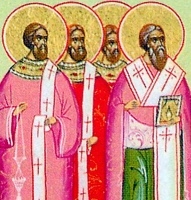
A group of deacons who were martyred with Pope Saint Sixtus II. We know nothing about them but their names and their deaths - Agapitus, Felicissimus, Januarius, Magnus, Stephen and Vincent.
beheaded on 6 August 258 in a cemetery on the Appian Way, Rome, Italy
https://catholicsaints.info/martyred-deacons-of-rome/
A group of Christian soldiers in the imperial Roman army. Martyred in the persecutions of Maximian. We know little else but the names - Carpophorus, Cassius, Exanthus, Licinius, Secundus and Severinus.
• c.295 on the north side of Lake Como, near Samolaco, Italy
• relics in the church of San Carpoforo, Como, Italy
soldier
https://catholicsaints.info/martyrs-of-como/
Thousands of people were murdered in the anti-Catholic persecutions of the Spanish Civil War from 1934 to 1939. I have pages on each of them, but in most cases I have only found very minimal information. They are available on the CatholicSaints.Info site through these links:
• Blessed Dalmacio Bellota Pérez
• Blessed Diodorus Hernando Lopez
• Blessed Francisco Gargallo Gascón
• Blessed Luis Villanueva Montoya
• Blessed María del Carmen Zaragoza y Zaragoza
• Blessed María Rosa Adrover Martí
• Blessed Rafaél Severiano Rodríguez Navarro
• Blessed Tomás Carbonell Miquel
• Albert of Sassoferrato
• Conrad Nantwein
• Donatus of Muenstereifel
• Isabel Remiñán Carracedo
• Leodebodo
• Matthew Noll
• Thomas Hunt
CatholicSaints.Info Portable Edition